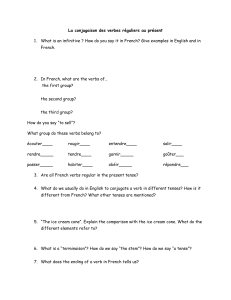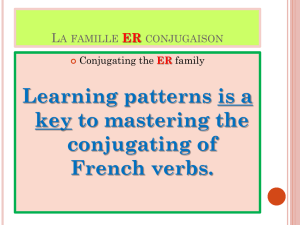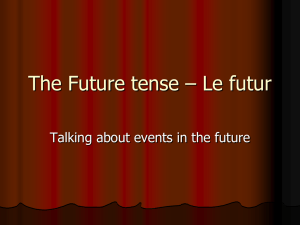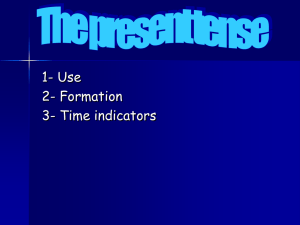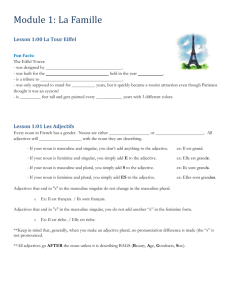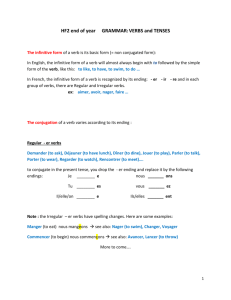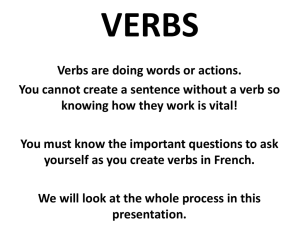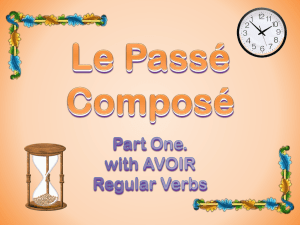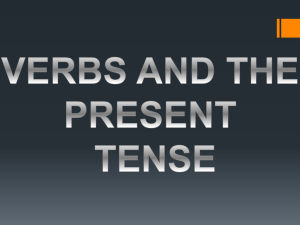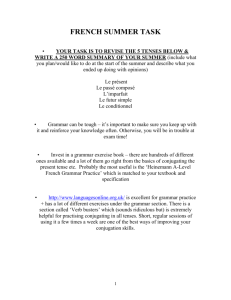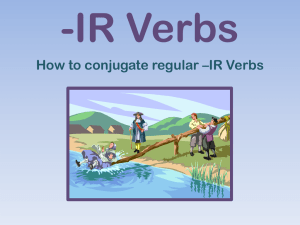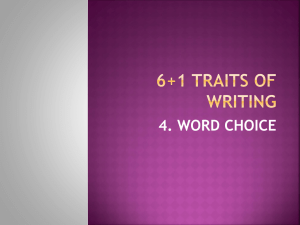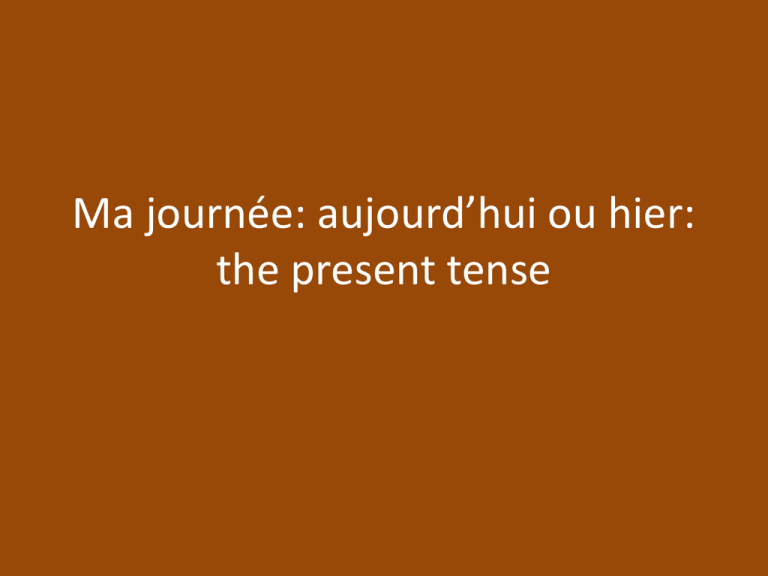
Ma journée: aujourd’hui ou hier:
the present tense
Starter: quizz (1 p 78)
• 1)What is the earlier age you can go to school in France? : 2,3 or
•
•
•
•
•
•
•
4 years old?
2) What is the name for primary school? : école primaire or
école élémentaire?
3) Students do not got to school on the Wednesday afternoon
but on which other day of the week do they go? Saturday or
Sunday?
4) At what age do students go to CES? 10, 11 or 12?
5) What is the name for year 7? Élèves, sixième or lycée?
6) What is the name of the dilpoma at the end of the lycéée
years?
7) What does happen if a student has not worked well enough
during the year?
8) At what age can you leave school?
Objectives
• To be able to recognise the different pronouns
• To understand when to use the pronouns
• To be able to use the 3 types of verbs in the
present tense.
Regular ER VERBS AT THE
PRESENT TENSE
What is a verb?
A verb is a word that describe some
sort of action
Examples
•
•
•
•
•
•
•
•
To
To
To
To
To
To
To
To
do
see
eat
run
go
drive
listen
read
•
•
•
•
•
•
•
•
To
To
To
To
To
To
To
To
think
speak
watch
tidy
clean
walk
smile
cry
What is a regular verb?
• A regular verb is a verb which follows
a set pattern
• Sometimes this pattern is carried
through a whole group of verbs
How many groups are there in French
for the regular verbs?
• There are 3 groups
• The first group is for the verbs ending in
ER
• The second group is for the verbs ending in
IR
• The third group is for the verbs ending in
RE
First group:ER verbs
Regarder = to watch
Habiter = to live
Ecouter = to listen
Aimer = to like
Détester = to hate
Travailler = to work
Manger = to eat
Quitter = to leave
Arriver = to arrive
Rentrer = to go
back
• Laver = to wash
•
•
•
•
How do you conjugate an ER verb
at the present tense?
You need the pronouns (I /YOU
/HE/SHE/WE/YOU/THEY)
You also need the correct verb
endings
What are pronouns ?
• A pronoun is a word used instead of a
noun
Example: it, her, I, they
Pronouns and when to use them
• I ---je
• You ---tu
• He/It---il
• She/It---elle
• When speaking about
yourself
• When speaking to a
friend, family member,
young person
• Instead of a masculine
word or speaking a
bout a male person
• Instead of a feminine
word or speaking about
a female person
• One /we---on
• When speaking about
people in general
• We ---nous
• When you are part
of a group
• You---vous
• When speaking to
more than one
person, a stranger,
to show respect
• They ---ils
• They---elles
• When speaking
about more than
one male, masculine
words or a mixed
sex group
• When speaking
about more than
one female,
feminine words
Rules for ER verbs
Take the ER off and replace with the following
endings
→Je -------E
→Nous-------ONS
→Tu-------ES
→Vous-------EZ
→Il-------E
→Ils-------ENT
→Elle-------E
→Elles-------ENT
→On-------E
Example: regarder =to watch
•
•
•
•
•
•
•
•
•
I watch
You watch (S)
He watches (MS)
She watches (FS)
We watch
We watch
You watch (PL)
They watch (MPL)
They watch (FPL)
•
•
•
•
•
•
•
•
•
Je regarde
Tu regardes
Il regarde
Elle regarde
On regarde
Nous regardons
Vous regardez
Ils regardent
Elles regardent
Habiter = to live
•
•
•
•
•
•
•
•
•
I live
You live
He lives
She lives
We live
We live
You live
They live
They live
•
•
•
•
•
•
•
•
•
J’habit e
Tu habit es
Il habit e
Elle habit e
On habit e
Nous habit ons
Vous habit ez
Ils habit ent
Elles habit ent
Aimer = to like / to love
•
•
•
•
•
•
•
•
•
I like
You like
He likes
She likes
We like
We like
You like
They like
They like
•
•
•
•
•
•
•
•
•
J’aim
Tu aim
Il aim
Elle aim
On aim
Vous aim
Nous aim
Ils aim
Elles aim
Quitter = to leave
•
•
•
•
•
•
•
•
•
I leave
You leave
He leaves
She leaves
We leave
We leave
You leave
They leave
They leave
•
•
•
•
•
•
•
•
•
Je quitte
Tu quittes
Il
Elle
On quitte
Nous
Vous
Ils
Elles quittent
Arriver = to arrive
•
•
•
•
•
•
•
•
•
I arrive
You arrive
He arrives
She arrives
We arrive
We arrive
You arrive
They arrive
They arrive
•
•
•
•
•
•
•
•
•
J’
Tu
Il
Elle
On arrive
Nous arrivons
Vous
Ils
Elles
Second group : IR verbs
2 types of endings
• First type
•
•
•
•
Sortir:
Partir:
Mentir:
Sentir:
• Second type:
to go out
to leave
to lie
to smell/feel
•
•
•
•
Finir:
Saisir:
Ralentir:
Vieillir:
to finish/end
to get hold of
to slow down
to get older
Second group : IR verbs
2 types of endings
•
•
•
•
•
•
•
Sortir: to go out
Je sors
Tu sors
Il/elle/on sort
Nous sortons
Vous sortez
Ils/elles sortent
* For “je”, “tu”, “il/elle/on”, take
off the “-tir” and add “s”,”s,””t”.
* For “nous, vous, ils/elles”, take
off the “-ir” and add “ons, ez, ent”
•
•
•
•
•
•
•
Finir: to finish/end
Je finis
Tu finis
Il/elle/ on finit
Nous finissons
Vous finissez
Ils/elles finissent
* For “je”, “tu”, “il/elle/on”, take
off the “ir” and add “s”,”s,””t”.
* For “nous, vous, ils/elles”, take
off the “-ir” and add “ssons, ssez,
ssent”
Second group : IR verbs
2 types of endings
Mentir: to lie
Je mens
Tu mens
Il/elle/on ment
Nous mentons
Vous ment ez
Ils/elles ment ent
•
•
•
•
•
•
•
Vieillir: to get old
Je vieillis
Tu vieillis
Il/elle vieilli t
Nous vieillissons
Vous vieilli ssez
Ils/elles vieilli ssent
Second group : IR verbs
2 types of endings
• Sentir: to smell/feel
• Ralentir: to slow down
•
•
•
•
•
•
•
•
•
•
•
•
Je
Tu
Il/elle/on
Nous
Vous
Ils/elles
Je
Tu
Il/elle/on
Nous
Vous
Ils/elles
Third group: verbs ending in –re
•
•
•
•
•
Vendre: to sell
Tendre: to tense(an object)
Attendre: to wait
Rendre: to give back/vomit
Descendre: To go down
Third group: verbs ending in –re
• Attendre: to wait
• J’attends
• Tu attend s
• Il/elle/on attend
• Nous attendons
• Vous attendez
• Ils/elles attendent
Take off the “re” and add “s”,”s”,”nothing”, “ons”, “ez”,
“ent”
Third group: verbs ending in –re
•
•
•
•
•
•
•
Descendre: to go down
Je descend s
Tu descend s
Il/elle/on descend
Nous descend ons
Vous descend ez
Ils/elles descend ent
•
•
•
•
•
•
•
Vendre: to sell
Je
Tu
Il/elle/on
Nous
Vous
Ils/elles
Irregular verbs
• Remember, in each group there are irregular verbs. Irregular
verbs are verbs that do not follow the same pattern. To know
them, you have to learn them off by heart. Some irregular
verbs are:
• Aller (to go)
• Venir( to come)
• Apprendre (to learn)
• However, if you feel you can remember them all ( there are a
lot of them) p’
• lease visit that site to help you:
• http://www.verb2verbe.com Write the verb you need and all
the tenses will appear!!!
Plenary
• In pairs, explain how to form the present
tense with the verbs ending with er, ir and re
• Give an example of each.
• What is the difference between regular and
irregular verbs? Can you give an example with
the full endings?

